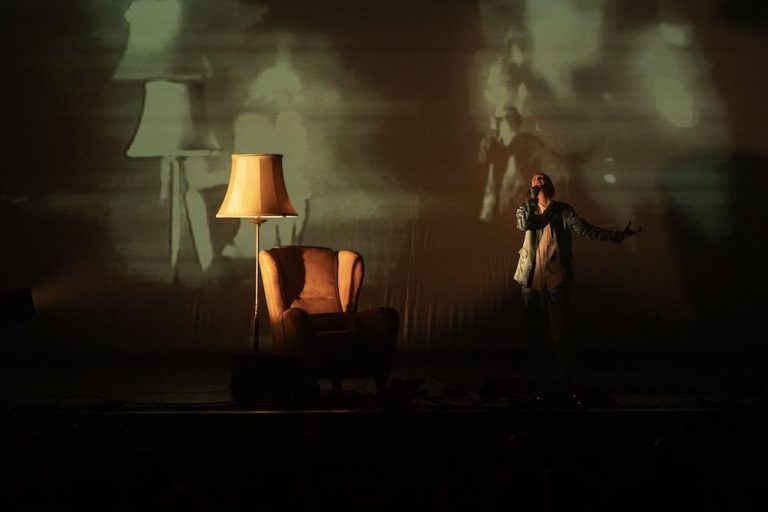“You become part of it right? That’s the seductive thing about working with sound. It’s a wonderful medium,” New Zealand composer Annea Lockwood puzzles exuberantly in an interview at The Hague’s DIY-stronghold Grey Space in the Middle. “It’s actually really hard to separate from an artefact, or something creative in that medium. You can’t. It goes into your body; we choose to be aware of it sometimes, and other times, we choose not to be.”
Lockwood is this year’s focus artist at Rewire Festival, an event that diligently interrogates our ever-evolving relationship with sound. More specifically, sound as an uncontainable force that stubbornly spills over the vacuums we create for ourselves, whether it’s concrete walls or a pair of Airpods. In a world dictated by systems, borders and numbers, sound inherently becomes a political agent. Many of the artists performing this year – Lockwood included – wield it as something positively intrusive.
Lockwood herself finds inspiration in non-human organic life: how insects, for example, often seen as annoying pests, are responsible for holding ecological balance aloft, and their demise will set a global catastrophe in motion. But large groups of bugs are also quite miraculous in how they coordinate, whether it’s a hive of bees cross-pollinating an entire ecosystem or a group of termites dismantling a building’s foundation. These types of phenomena are something to admire and nourish, rather than to isolate ourselves from. There is so much nature tells us that human beings have forgotten in supposed evolutional progress – who knows, rekindling with some of its survival mechanisms might lead to a better tomorrow.
To once again borrow the words of wisdom from Lockwood: “As we develop an awareness in our work and express it through our work, these aspects of how organisms flourish, it does spread into the general culture. And as it spreads into the general culture, it does infiltrate policies. The policies of the bureaucracies that were making this mess in the first place. And little by little, they begin to affect and influence those decision makers.”
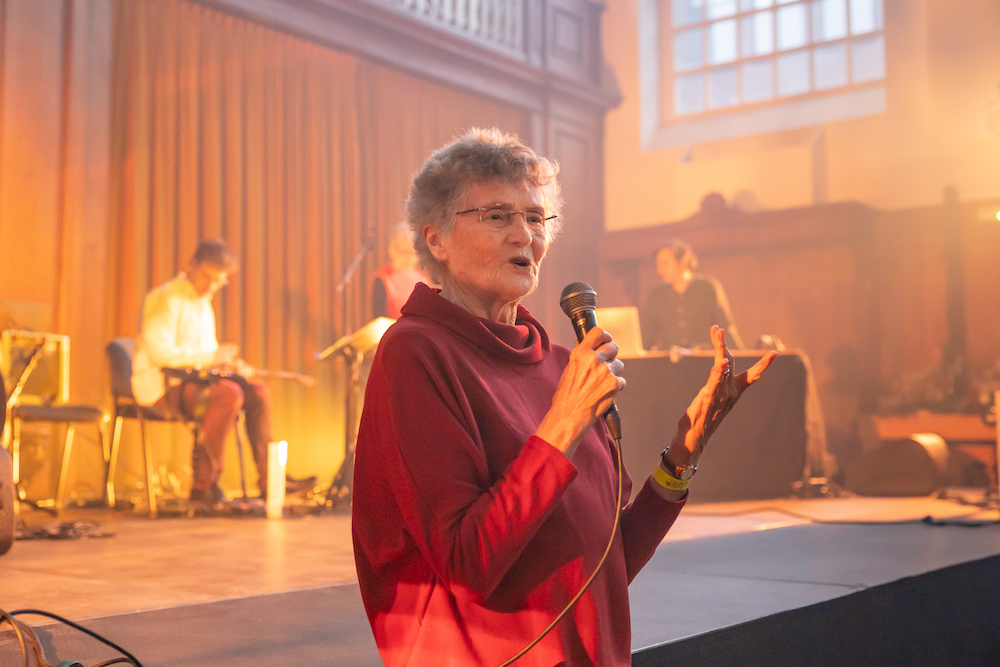
Comforting thoughts in troubling times. And Amirtha Kidambi’s Elder Ones open the always homely Koorenhuis with a similar imperative. To this dazzling free-jazz collective improvisation isn’t just liberation from restrictive pop hierarchies, but an ardent form of “survival practice”. This is evident even before even the first note is played. We applaud when the band members take the stage – yet Kidambi is quick to point out the strange decorum of clapping before the experience has even unfolded itself. It sets a disquieting tone. As impressive as the musicianship of Kidambi’s Elder Ones is, it’s deployed to incisively attack festering troubles at large: the Muslim genocide in India which has been overshadowed by the Israel-Palestine conflict, and the farmers protests in the Northern state of Punjab. Meditative elements of Indian Carnatic music, are broken apart with instrumental skirmishes in the tradition of Cecil Taylor and Art Blakey. Somewhere the spirit of close collaborator jaimie branch, who played this exact room two years ago, roams about. The Elder Ones’ set is restless and constantly shapeshifting, refusing to be chased into the proverbial corner. Revolt music that makes itself fully understood, rendering the binary of spoken language obsolete.
In the wake of that confronting incursion, Julia Holter‘s set at Paard’s big room acts as a sedative and a balm. Holter – who has performed at Rewire before – seems to know this instinctively, opening her set with the cordial avant-pop of “Sea Calls Me Home”. Letting your brainwaves adjust to verses and choruses at a festival where artists mess with strange machines (a special shoutout to Lolo & Osaku and Maxime Denuc here) is in this specific case a real trip.
The generous physicality of Holter’s illusory pop overlaps with Phét Phét Phét‘s hypnotic performance at Korzo. Composer and saxophone player Jarrett Gilgore may be the de facto face of the project, this nomadic soul performs with a ever-changing cast of collaborators as if entering a spiritual group intervention. The trio tonight is rounded out by synth player Ethan Braun and drummer Frank Rosaly – each musician occupies a corner of the canvas, working their way towards the center with soft trepidation. No one is taking point: each instrument is performed with the care and awareness of enriching the overall landscape. This sensitivity makes the notion of a stage a little bit redundant, perhaps, as Phét Phét Phét’s twining progressions warmly embrace onlookers, surrendering the final corner of the picture to their tranquil, reassuring silence.
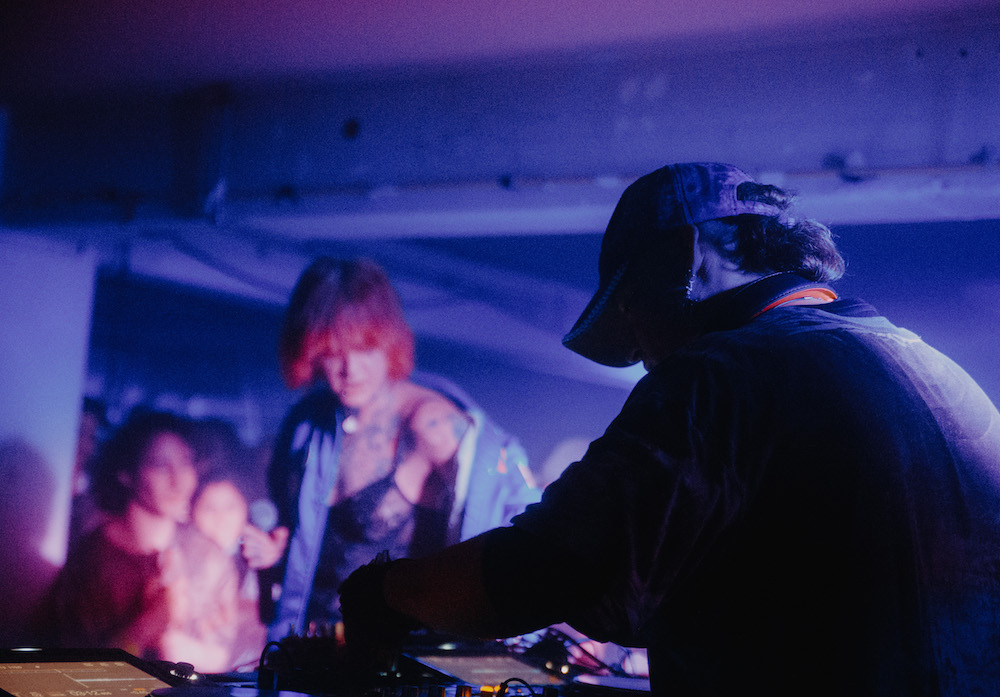
The first Rewire day unravels in a swirl of chaos and cacophony, punctuated by NAH’s boisterous A/V performance at Korzo and Deli Girls‘ incendiary noise assault on Grey Space. As we stumble in a daze towards a pillow to rest on, we’ve already had our due fill of the extremes. On Saturday, we head to Koninklijke Schouwburg for experimental Mexico City-quartet Amor Muere. What we’re witnessing is an anomaly by any stretch or concept: four distinct artists performing as their most uncompromising, open-hearted selves, magically coalescing into something more expansive and simultaneously undefinable. Mabe Fratti‘s inquisitive cello playing and cellophane vocals wander through the music like roots burrowing through concrete. Concepción Huerta operates tapes and synth drones like a wisened weather goddess. Camille Mandoki‘s resonant, androgynous voice and whirring melodies add darker, more spectral hues to counterbalance Fratti’s granular cello textures. And finally, Gibrana Cervantes instills a heavy metal brio to her infammable violin chops, becoming a scene stealer more than once.
As if soundtracking a Leonora Carrington-story, their combined forces dump you into a surreal landscape where none of the conventional rules of quote unquote ‘pop music’ listening apply. No one gets in each other’s way: I found myself mesmerised by Mandoki and Fratti’s unearthly singing, while Huerta’s rumbling soundscapes and Cervantes’ shrieking violins loom like an impending storm. Oh, what I would give to witness Amor Muere live-score Episode 8 of Twin Peaks: The Return: an arm and a leg maybe?
The live debut of Fratti’s other vehicle Titanic – also at Koninklijke Schouwburg – was just as impressive of a display. Though more accessible and – for lack of a better word – ‘song-based’, this project shares some DNA with Spirit Of Eden/Laughing Stock-era Talk Talk: sensual soft-jazz vestiges alternate hair-raising noise outbursts, leaving all witnesses aghast and awed at how a group of musicians can achieve this kind of genre-shattering dynamism during, I dunno, their first live performance ever?
The impassioned chemistry between Fratti and the project’s other linchpin (and partner) Hector Tosta – hunched over his piano like a symphonist banished to damnation – obviously plays a huge factor. But their supporting cast deserve plenty of flowers too: drummer Friso van Wijck, bass player Jasper Werij (also one-third of excellent Rotterdam noise punks Texoprint) and Crack Cloud-sax player Nat Philipps put their own stamp on Titanic’s enchanting post-prog deviations. Philipps had especially big shoes to fill, replacing the aforementioned Jarrett Gilgore, and damn if I say it, but his visionary, starry-eyed playing came scary close to Pharoah’s legendary turn on Journey In Satchinananda. There, I said it.
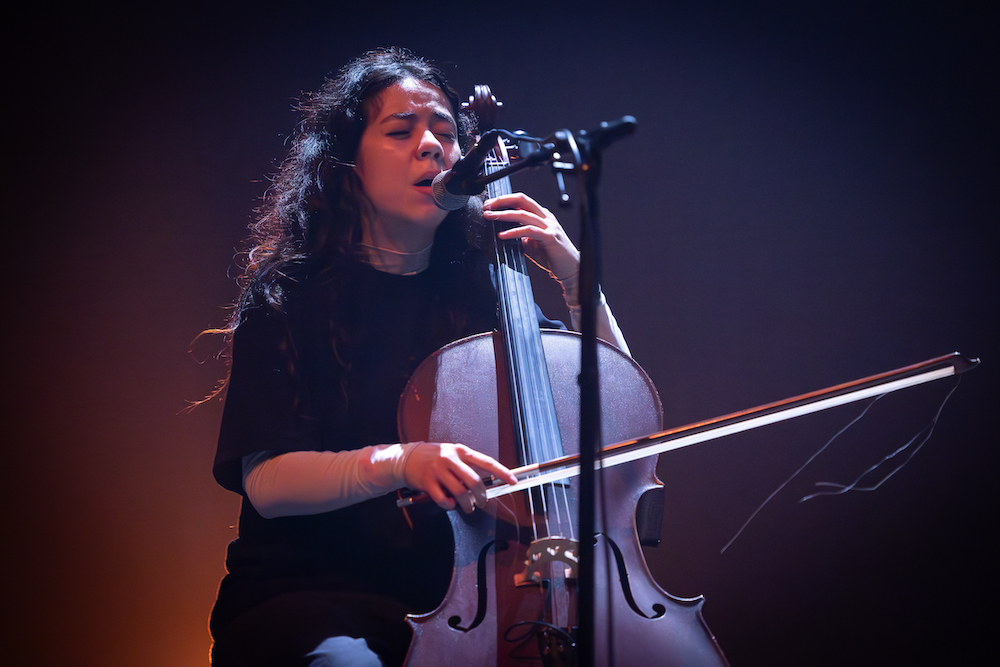
Even before entering the balcony area of Koninklijke Schouwburg to catch Gazelle Twin‘s set, you feel the fear creeping in. The corridors leading up to the room are pitch black, and well… lets such say the unsettling thumps resonating from within aren’t slowing down your heartbeat. Once settled on the upper balcony, we gaze down on a rather minimal living room simulation, with an armchair and a room luminaire. It’s the kind of realistic horror setting prevalent in movies like Poltergeist, The Ring and Requiem for a Dream. Elizabeth Bernholz acts out her role as the ghostly apparition on the cover of Black Dog: barefoot, dressed in pale blue pajama’s and surrounded by microphones and pedals. Performance-wise this show looks a lot more prosaic than the creatures Gazelle Twin depicted in the past, yet no less unsettling.
It veers somewhere in-between a 1920s silent film and Chris Cunningham on the overall spooky scale, yet the performance itself – despite all its bone-rattling hauntologies – captures a raw beauty as well. Bernholz’s operatic voice channels the unearthly vibrato of The Drift-era Scott Walker and even Bowie in his curtain call Blackstar; just as easily she also lets out demonic snarls and hisses, proving to be one of the more versatile vocalists we encounter at this Rewire edition. Briefly near the end of the show the lights of the theater go on, and Bernholz sings a tender rendition of “A Door Opens”. It’s a strangely beautiful respite from all the skin-crawling anguish – briefly you believe there are no monsters hiding underneath the bed. Most horror movies end with a cliffhanger, however, and this Gazelle Twin performance is no different: the sinister shadowplay rears its ugly head with “Unstoppable Force”. The lights simmer down into darkness – and when they go back on, the ghost has disappeared without a trace.
Jlin‘s big audiovisual collaboration with Florence To at Paard that same night drew plenty of hype from various pundits prior to Rewire, and indeed, Jerrilynn Patton proves why she is one of the most imaginative and innovative electronic producers working today. Polyrhythmic beats in non-conventional time signature bounce across the room arpeggiated synth tapestries jitter all up the wazoo. But the way it all translated to the room left a wee bit to be desired: people seem more preoccupied with trying to act cool than having a jolly time. Olof Dreijer‘s set at Korzo unwrapped as the welcome antithesis. Drawing from the weird ‘n wonky source code of The Knife (the seminal electronic act formed with sibling Karin, who played an unforgettable Fever Ray show at Rewire last year) Dreijer’s tenure behind the decks was pleasantly gauche and madcap, with the occasional crowd-pleasing mashup to keep things interesting.
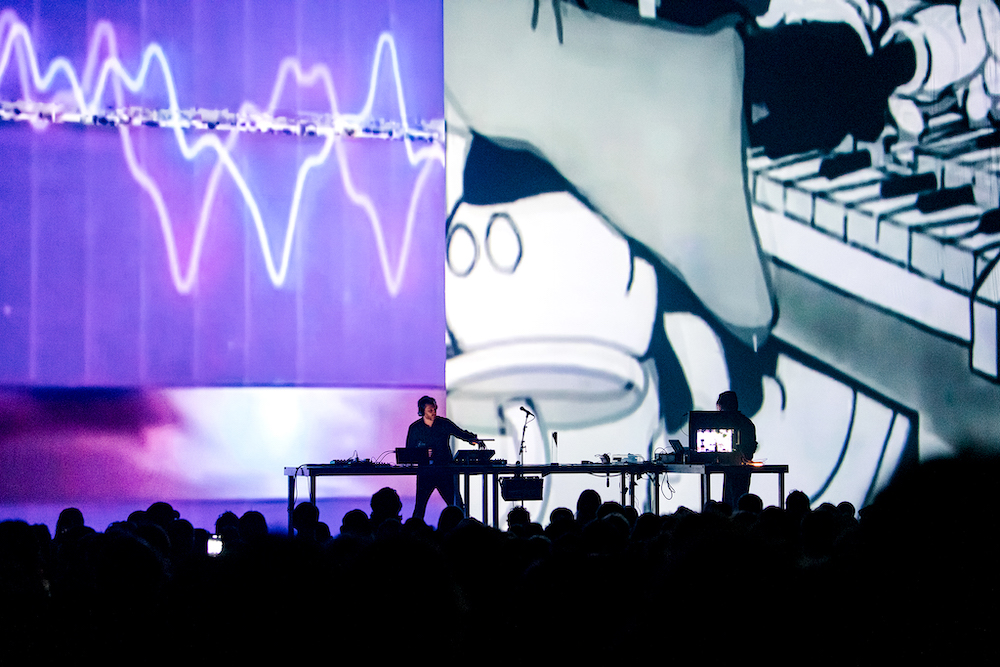
Oneohtrix Point Never‘s anticipated closing set exists in that perfect sweet spot between Jlin’s cerebral brilliance and Olof Dreijer’s scatterbrained abandon. Daniel Lopatin kind of admitted it himself in a recent interview with The Creative Independent: he’s had plenty bona fide’s already to be ‘over’ himself, so playing nothing but “minimalist paradiddles”, as he himself so tongue-in-cheekly put it, seems like a stretch. As impressive as the audiovisual hijinks are in the equally impressive hypermodern firmament of Amare, Lopatin still manages to inject a giddy house show energy into it all.
0PN’s co-conspirator tonight, Freeka Tet, pantomimes Lopatin’s show in a geeky miniature puppet show, which may or may not be taken as a fun jab at the whole ‘regular dude fidgeting stoically behind a station of equipment’-trope. As the celestial blight of “Krumville” and “A Brightly Lit Path” unbridle blissfully into the room , them technical difficulties earlier in the show are forgiven and forgotten. In fact, such a ceremonious moment unfolding after a brief parenthesis of human error becomes all the more powerful and emotionally resonant. Who needs Intelligent Dance Music when you’ve got Intelligent Dork Music?
0PN’s impressive performance wraps up Rewire 2024 in the most holistic fashion imaginable: vibrations infiltrating our minds, our bodies and our spirits. We have chosen awareness.

